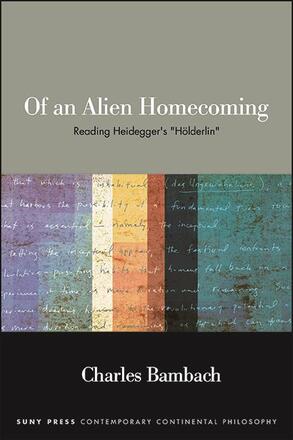
Of an Alien Homecoming
Reading Heidegger's "Hölderlin"
Alternative formats available from:
The first book-length study in English of the Heidegger-Hölderlin relation, addressing the tension between Heidegger's political commitments during National Socialism and Hölderlin's ideal of poetic dwelling.
Description
Few themes resonate as powerfully in Heidegger as those connected to homecoming, homeland, and Heimat. This emphasis plays out most powerfully in Heidegger's reading of Hölderlin and his turn towards language, art, and poetizing as a way of thinking through the poet's relevance in the epoch of homelessness and the abandonment of the gods. As the first book-length study in English of the Heidegger-Hölderlin relation, Of an Alien Homecoming addresses the tension within Heidegger's work between his disastrous political commitments during the era of National Socialism and his attempts to open a path to a German future nurtured on Hölderlin's ideal of poetic dwelling. Charles Bambach reads this work on Hölderlin from 1934–1948 in conversation with the Black Notebooks and Heidegger's metapolitics, even as he uncovers an ethical dimension within Heidegger that pervades his reading of poetry. Throughout all of these various stages on Heidegger's thought path, Hölderlin remains the poet who poetizes the possibility of finding our lost home amidst the homelessness brought about in the epoch of technological thinking.
Charles Bambach is Professor of Philosophy at the University of Texas at Dallas. He is author of Thinking the Poetic Measure of Justice: Hölderlin-Heidegger-Celan, also published by SUNY Press.
Reviews
"Of an Alien Homecoming is a landmark achievement and a unique insight into the still-hidden essence of European modernity." — CHOICE
"This is the definitive study of Heidegger and Hölderlin in any language. It goes far beyond its competitors in its reconstruction and evaluation of the historical-political background to Heidegger's engagement with Hölderlin, as well as in its thorough knowledge of the entirety of Heidegger's formidable corpus." — Ian Moore, Loyola Marymount University/St. John's College
"A much-needed study that will become indispensable reading for all those wanting to continue the conversation about the importance (including the pitfalls) of Heidegger's 'Hölderlin.'" — Krzysztof Ziarek, University at Buffalo, State University of New York